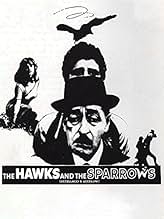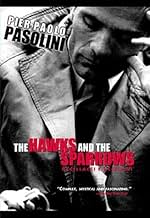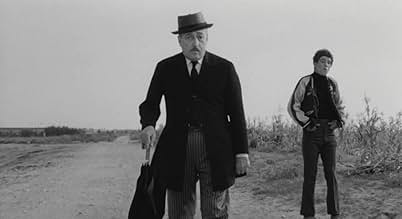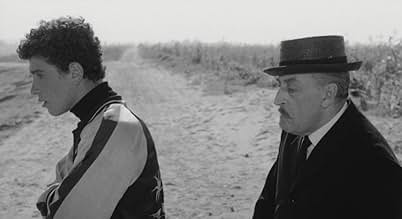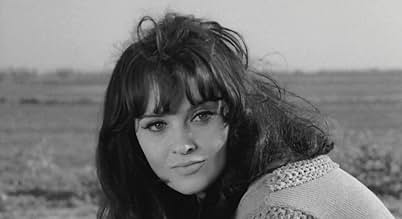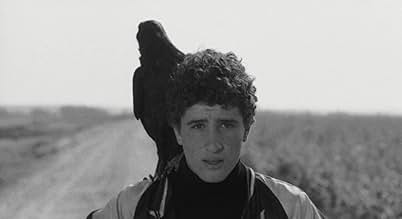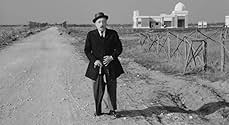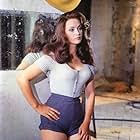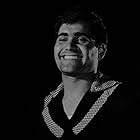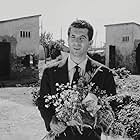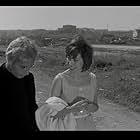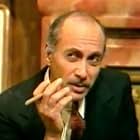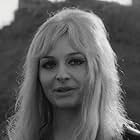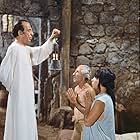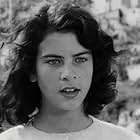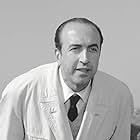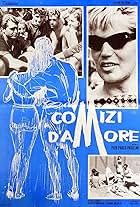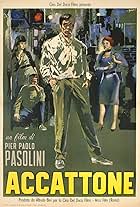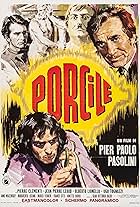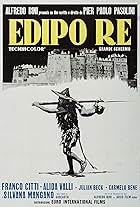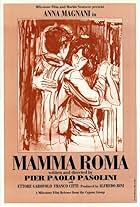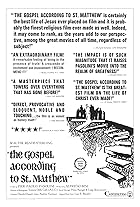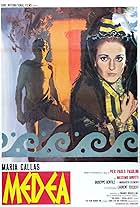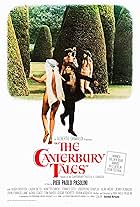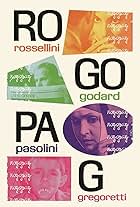IMDb RATING
7.2/10
5.8K
YOUR RATING
Totò and his son Ninetto are drifting on a road in Italy when they meet a speaking crow.Totò and his son Ninetto are drifting on a road in Italy when they meet a speaking crow.Totò and his son Ninetto are drifting on a road in Italy when they meet a speaking crow.
- Awards
- 4 wins & 4 nominations
Totò
- Totò Innocenti
- (as Toto')
- …
Ninetto Davoli
- Ninetto Innocenti
- (as Davoli Ninetto)
- …
Nello Appodia
- Party Guest
- (uncredited)
Gabriele Baldini
- Dante's Dentist
- (uncredited)
Pietro Davoli
- Mascalzone
- (uncredited)
Rossana Di Rocco
- Ninetto's Girlfriend
- (uncredited)
Storyline
Did you know
- TriviaFilm's opening credits are not only displayed on screen but also comically sung in Italian to a jaunty Ennio Morricone score, with a memorably droll rhyming of the film title with the director's full name.
- Crazy creditsThe opening credits are performed as a song.
- ConnectionsEdited into Histoire(s) du cinéma: Une histoire seule (1989)
- SoundtracksUccellacci E Uccellini (Titoli Di Testa)
Composed by Ennio Morricone and Pier Paolo Pasolini
Performed by Domenico Modugno
Featured review
"Uccellacci e Uccellini" is probably the best chance to get acquainted with Pasolini's political thoughts pre-1968 other than reading him. It's a candid, allegoric and provocative attempt to express his ideas about a very specific epoch in Italian history, after the death of left-wing political "father" Palmiro Togliatti in 1964 (whose funeral is one of the great scenes of "Uccellacci") and the "death" of Neo-Realism. It also reflects the intense differences between social classes, intellectual trends and political forces that would lead to the acts of "contestazione generale" in the late 1960s.
WIth "Uccellacci", we can learn some of Pasolini's thoughts on Marxism, Fascism, religion, the Catholic church, the role of intellectuals, the bourgeoisie, political parties, the dire conditions of the campesinato and the borgate (slums), poverty, greed, famine, cultural and social apartheid -- you name it. That's the main problem with this passionately personal and visually stunning walking-road-movie: too many targets, too little time to hit them all in the bull's eye.
A natural follow-up to his documentary "Comizi d'Amore" (1965) -- in which he traveled all over Italy interviewing people about their thoughts on love and sex -- Pasolini shows in "Uccellacci e Uccellini" the unofficial apartheid in Italy, a basically "unmelting" pot of dozens of different ethnic, linguistic and cultural backgrounds "artificially" unified in mid-19th century but still plagued by social/economical/cultural chasm. And he also denounces the sterility of the discourse of the "official-left" intelligentsia, which he clearly despised (and which heavily attacked him on many issues and occasions).
In the Italy of the 1960s, the Left was concerned with the struggle of workers, intellectuals and students against the establishment; the contadini (peasants) weren't even properly considered as a political force -- they were the symbol of archaic, pre-boom Italy. Pasolini was the main voice to take the side of the peasants; against famine, sophism falls flat, as the intellectual crow will shockingly discover at the end of "Uccellacci". The political discourse can no longer be theoretical; it has to be urgent, pragmatic, directed towards action. Godard, Bertolucci, Alea, Ruy Guerra, Resnais and others also approached the theme at the time; but, unlike the majority of intellectual-filmmakers of the 60s, Pasolini ACTUALLY had had a rural (though highly literate) background.
Wildly (in)famous at the time as poet/filmmaker/writer/anti-Vatican political activist (but, contrary to a false general belief, he was never a gay militant, though he certainly wasn't in the closet), Pasolini picks up the journey into the "Italia profonda" from Visconti's "Ossessione" and "La Terra Trema" to most of Rossellini and leaves his own distinctive signature in the very complex era of the economic boom.
Pasolini smartly uses the parable genre with much comic relief so he can talk about serious political issues in a "commercial" film, relying heavily on veteran champion Totò's immense talent, charisma and experience. In one of his last films, Totò is joined by 16 year-old newcomer Ninetto Davoli, here in a completely relaxed, natural performance; they make a perfect duo. The cinematography by master Tonino delli Colli features jaw- dropping locations and compositions. The music by Ennio Morricone is memorable, his very personal touch instantly recognizable; and there are funny sung (!) opening credits. There are two minor letdowns that prevent total audience adhesion: 1) it lacks a brighter tempo, the rhythm falters at times; 2) the episodes are rather loosely linked 3) there are episodes which might be shorter (the wonderful but overlong St. Francis story) and others might be longer (the visit to the rich landowner's house).
"Uccellacci e Uccellinni" is a very personal Pasolini ("my favorite" he said in a 1969 interview) and one of his few films not based on literature classics, mythology or the Bible. It's mandatory for all interested in Pasolini's work and/or the political issues of the 1960s, as well as for fans of the unforgettable, one and only Totò.
WIth "Uccellacci", we can learn some of Pasolini's thoughts on Marxism, Fascism, religion, the Catholic church, the role of intellectuals, the bourgeoisie, political parties, the dire conditions of the campesinato and the borgate (slums), poverty, greed, famine, cultural and social apartheid -- you name it. That's the main problem with this passionately personal and visually stunning walking-road-movie: too many targets, too little time to hit them all in the bull's eye.
A natural follow-up to his documentary "Comizi d'Amore" (1965) -- in which he traveled all over Italy interviewing people about their thoughts on love and sex -- Pasolini shows in "Uccellacci e Uccellini" the unofficial apartheid in Italy, a basically "unmelting" pot of dozens of different ethnic, linguistic and cultural backgrounds "artificially" unified in mid-19th century but still plagued by social/economical/cultural chasm. And he also denounces the sterility of the discourse of the "official-left" intelligentsia, which he clearly despised (and which heavily attacked him on many issues and occasions).
In the Italy of the 1960s, the Left was concerned with the struggle of workers, intellectuals and students against the establishment; the contadini (peasants) weren't even properly considered as a political force -- they were the symbol of archaic, pre-boom Italy. Pasolini was the main voice to take the side of the peasants; against famine, sophism falls flat, as the intellectual crow will shockingly discover at the end of "Uccellacci". The political discourse can no longer be theoretical; it has to be urgent, pragmatic, directed towards action. Godard, Bertolucci, Alea, Ruy Guerra, Resnais and others also approached the theme at the time; but, unlike the majority of intellectual-filmmakers of the 60s, Pasolini ACTUALLY had had a rural (though highly literate) background.
Wildly (in)famous at the time as poet/filmmaker/writer/anti-Vatican political activist (but, contrary to a false general belief, he was never a gay militant, though he certainly wasn't in the closet), Pasolini picks up the journey into the "Italia profonda" from Visconti's "Ossessione" and "La Terra Trema" to most of Rossellini and leaves his own distinctive signature in the very complex era of the economic boom.
Pasolini smartly uses the parable genre with much comic relief so he can talk about serious political issues in a "commercial" film, relying heavily on veteran champion Totò's immense talent, charisma and experience. In one of his last films, Totò is joined by 16 year-old newcomer Ninetto Davoli, here in a completely relaxed, natural performance; they make a perfect duo. The cinematography by master Tonino delli Colli features jaw- dropping locations and compositions. The music by Ennio Morricone is memorable, his very personal touch instantly recognizable; and there are funny sung (!) opening credits. There are two minor letdowns that prevent total audience adhesion: 1) it lacks a brighter tempo, the rhythm falters at times; 2) the episodes are rather loosely linked 3) there are episodes which might be shorter (the wonderful but overlong St. Francis story) and others might be longer (the visit to the rich landowner's house).
"Uccellacci e Uccellinni" is a very personal Pasolini ("my favorite" he said in a 1969 interview) and one of his few films not based on literature classics, mythology or the Bible. It's mandatory for all interested in Pasolini's work and/or the political issues of the 1960s, as well as for fans of the unforgettable, one and only Totò.
- How long is The Hawks and the Sparrows?Powered by Alexa
Details
- Release date
- Country of origin
- Language
- Also known as
- Jastrebovi i vrabci
- Filming locations
- Production company
- See more company credits at IMDbPro
Box office
- Gross worldwide
- $3,348
- Runtime1 hour 31 minutes
- Color
- Sound mix
- Aspect ratio
- 1.85 : 1
Contribute to this page
Suggest an edit or add missing content

Top Gap
By what name was The Hawks and the Sparrows (1966) officially released in India in English?
Answer

